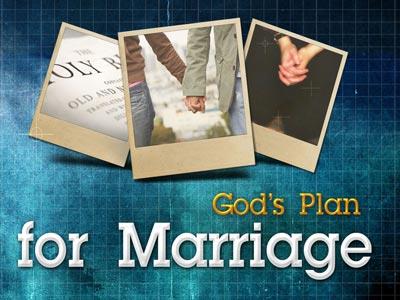-
Is Marriage That Important
Contributed by James Buchanan on Nov 28, 2017 (message contributor)
Summary: A sermon which deals with certain issues regarding the Marriage Amendment and same-sex marriages.
I want to talk to you this morning about a topic that is sensitive to me, and is sensitive to a lot of you. As a warning, this sermon is rated PG—we are going to deal with some fairly sensitive issues, and I want to let you know that if you have children upstairs with us, we do have a children’s church program going on downstairs right now that all kids are invited to attend.
There is a Marriage Amendment which is being debated, not only in Congress, but across this country. It is a proposal which, if passed, will define what marriage is limited to be. It states the following: "Marriage in the United States shall consist only of the union of a man and a woman.
Neither this Constitution, nor the Constitution of any State, shall be construed to require that marriage or the legal incidents thereof be conferred upon any union other than the union of a man and a woman."
This amendment is being proposed because of the increasing demands for same-sex couples to get married. In other words, certain women want the ability to marry other women, and certain men want the ability to marry other men. The question that concerns us today is simply this: Is marriage that important?
Is marriage something that is so important that we ought to fight to preserve the traditional understanding of it—one man and one woman? Obviously, depending on who you ask, you will get wildly different answers. Here are some quotes for your consideration this morning.
James Dobson said this in the context of what would happen if same-sex couples were allowed to marry:
"If marriage means everything, it means absolutely nothing. It will mean nothing to same-sex as well as opposite-sex couples. The current decline of the institution of marriage will be accelerated. Increasing numbers of couples will elect to simply ’live together’." Dr. James C. Dobson, of Focus on the Family.
Here’s a quote from someone on the other side of the fence, describing a marriage ceremony:
"Then hugs. And kisses. Love was being expressed. Love that finally had found a tiny crack from which to shine." Rev. Ed Evans is the pastor of First Congregational United Church of Christ in Vancouver, WA, commenting on same-sex marriage ceremonies he was performing in Multnomah County, OR.
When asked the question, "I believe God meant marriage for men and women. How can I support marriage for same-sex couples?", the Human Rights Campagin website, an openly gay and lesbian activist website, replied, Many people who believe in God – and fairness and justice for all – ask this question. They feel a tension between religious beliefs and democratic values that has been experienced in many different ways throughout our nation’s history. That is why the framers of our Constitution established – and we as a people have repeatedly reaffirmed – the principle of separation of church and state. That principle applies no less to the marriage issue than it does to any other.
Indeed, the answer to the apparent dilemma between religious beliefs and support for equal protections for all families lies in recognizing that marriage has a significant religious meaning for many people, but that it is also a legal contract. And it is strictly the legal -- not the religious – dimension of marriage that is being debated now.
Consider, for example, the difference in how the Catholic Church and the U.S. government view couples who have divorced and remarried. Because church tenets do not sanction divorce, the second marriage is not valid in the church’s view. The government, however, recognizes the marriage by extending to the remarried couple the same rights and protections of marriage as those granted to every other married couple in America. In this situation – as would be the case in marriage for same-sex couples – the church remains free to establish its own teachings on the religious dimension of marriage while the government upholds equality under law.
While each faith would remain free to make its own determination about same-sex relationships, it should also be noted that there are a growing number of religious communities that have searched their own consciences and decided to bless same-sex unions. Among them are Reform Judaism, Unitarian Universalists and the Metropolitan Community Church. The Presbyterian Church (USA) also allows ceremonies to be performed, although they are not considered the same as a marriage ceremony. And the Episcopal Church and United Church of Christ allow individual churches to set their own policies on same-sex unions.
Granting marriage rights to same-sex couples would not require Christian, Jewish, Muslim or any other religions to perform these marriages. It would not require churches, synagogues or other religious institutions to permit these ceremonies to be held on their grounds. It would not even require that religious communities discuss the issue. People of faith would remain free to make their own judgments about what makes a marriage made in the eyes of God – just as they are today.

 Sermon Central
Sermon Central



